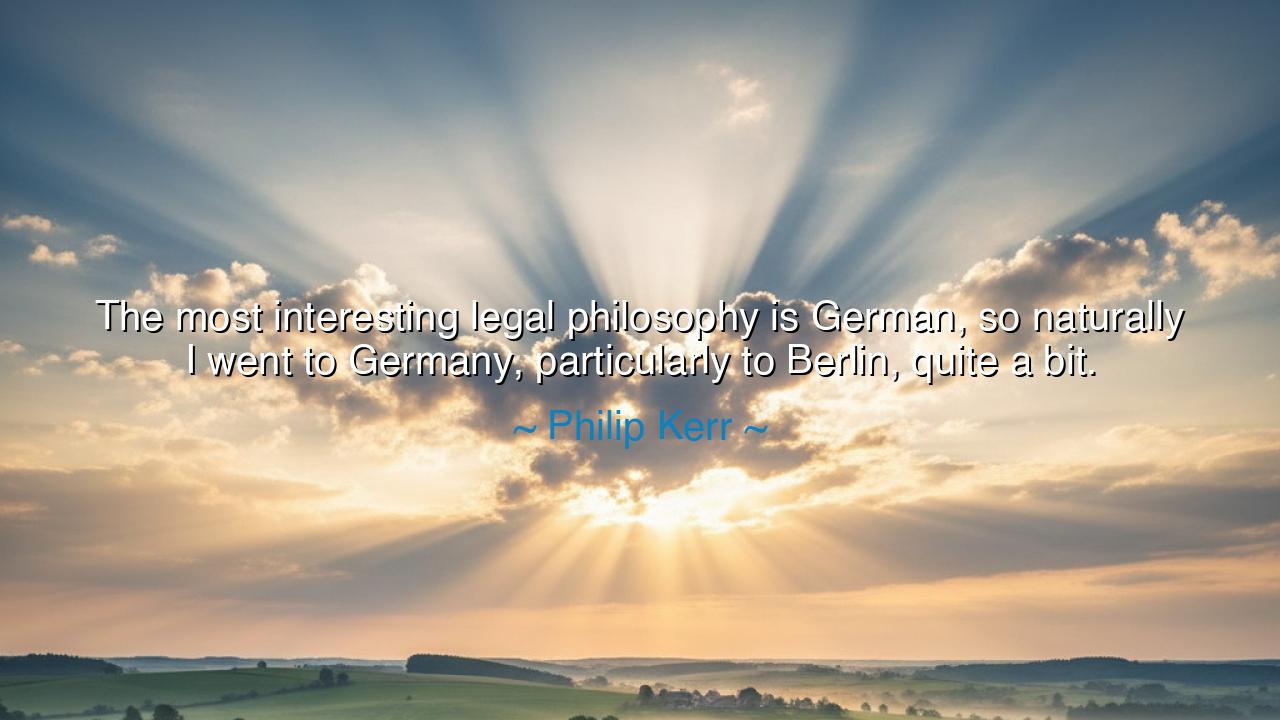
The most interesting legal philosophy is German, so naturally I
The most interesting legal philosophy is German, so naturally I went to Germany, particularly to Berlin, quite a bit.






In the annals of human thought, few pursuits are as enduring as the study of law and the philosophy that undergirds it. Philip Kerr’s words, “The most interesting legal philosophy is German, so naturally I went to Germany, particularly to Berlin, quite a bit,” reveal a seeker’s devotion to wisdom, curiosity, and the cultivation of understanding beyond one’s immediate horizons. Here lies a meditation on intellectual exploration, the pursuit of knowledge, and the transformative power of immersing oneself in the ideas and traditions of other cultures.
From the academies of Athens to the universities of medieval Europe, scholars recognized that the study of law was not merely a technical exercise, but a philosophical quest. The law reflects the values, ethics, and priorities of a society, and understanding it requires both immersion and contemplation. Kerr’s choice to study German legal philosophy illustrates this principle: by engaging with the thought of another nation, one gains perspective on justice, obligation, and the structures that govern human interaction.
History offers vivid illustration. In the 19th century, the German tradition of legal philosophy, particularly the works of thinkers such as Immanuel Kant, Georg Wilhelm Friedrich Hegel, and Friedrich Carl von Savigny, reshaped the understanding of law in Europe. Kant’s notion of duty and moral law, Hegel’s conception of the state as an ethical organism, and Savigny’s emphasis on historical context and the evolution of law profoundly influenced legal thought worldwide. Kerr’s travels to Berlin reflect a deliberate engagement with these profound ideas, seeking not merely theory, but lived and contextual understanding.
Consider a concrete example: the development of the German Civil Code (Bürgerliches Gesetzbuch) in 1900, which systematized centuries of legal philosophy into practical law. Its intricate balance of individual rights, social obligations, and historical consciousness reflects the depth and rigor of German legal thought. By studying in Berlin, Kerr aligned himself with the intellectual currents that produced such monumental work. His immersion was an active participation in a tradition that values precision, philosophy, and the interplay of ethics and law.
The philosophical resonance of Kerr’s journey is profound: true understanding arises not from abstract reading alone, but from engagement with the culture, language, and environment that produced the ideas. To study German legal philosophy without visiting Germany would be to separate thought from context. Immersion in Berlin allowed Kerr to witness the interaction of theory and society, gaining insight into how legal philosophy shapes—and is shaped by—the lives of citizens.
For modern seekers of knowledge, the lesson is clear: intellectual curiosity requires courage, mobility, and openness to foreign traditions. To deepen understanding, one must step beyond familiar borders, confront new ideas directly, and engage with thinkers and texts in their native contexts. Kerr’s example reminds us that scholarship is not passive, but an active pursuit of insight through experience and dialogue.
Practically, this approach extends beyond law. Whether in science, literature, or governance, immersing oneself in diverse intellectual traditions fosters broader perspective, critical thinking, and innovation. Travel, study, and engagement with other cultures and philosophies transform understanding from theoretical abstraction into living, actionable wisdom. Kerr’s journeys exemplify the value of bridging cultures in the pursuit of mastery.
Thus, Philip Kerr’s words endure as a timeless exhortation: the pursuit of the most interesting and profound ideas demands courage, curiosity, and immersion. Let this reflection guide those who seek understanding, reminding all that wisdom is not merely learned in one’s home or language, but cultivated across borders, traditions, and epochs. In engaging deeply with the thought of others, we illuminate our own minds and contribute to the enduring dialogue of human knowledge.






AAdministratorAdministrator
Welcome, honored guests. Please leave a comment, we will respond soon